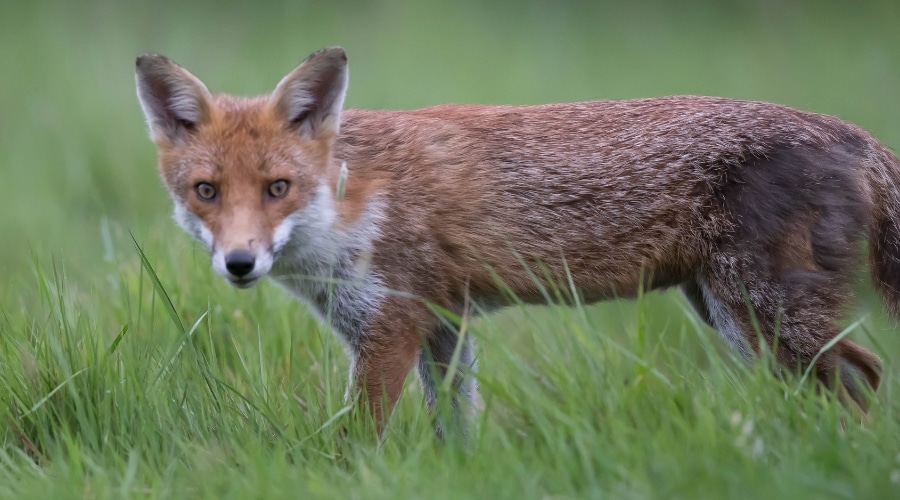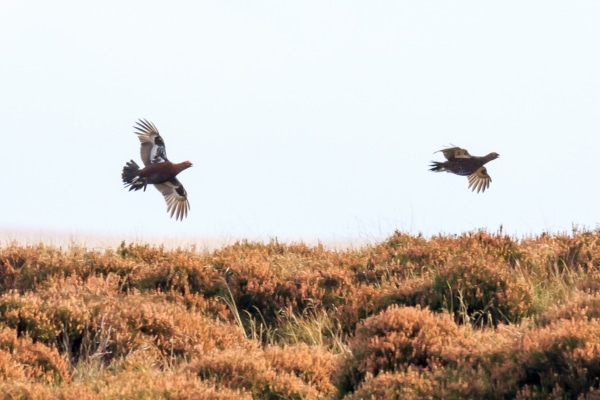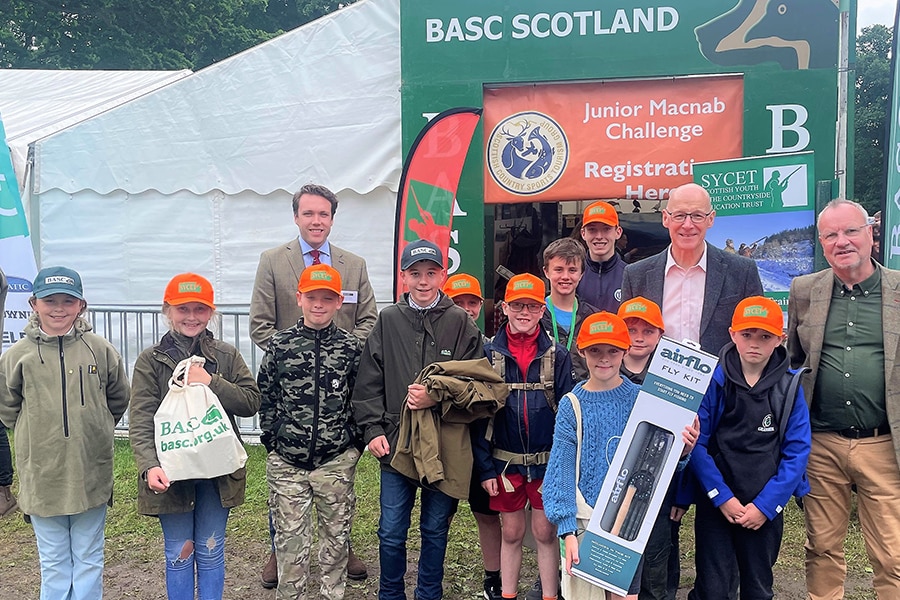
Royal Mail and Parcelforce knife policy update
From 7 May, Royal Mail and Parcelforce will prohibit the carriage of some types of knives, but exclusions apply for hobbies and trades, says Conor O’Gorman.
Get information on the legal shooting season for mammals and birds in the UK.
Apply for funding for your project or make a donation today
Comprehensive information and advice from our specialist firearms team.
Everything you need to know about shotgun, rifle and airgun ammunition.
Find our up-to-date information, advice and links to government resources.
Everything you need to know on firearms law and licensing.
All the latest news and advice on general licences and how they affect you.

The Scottish government consultation which proposes a ban on the use of snares in Scotland closes 3 October.
The consultation, which is part of the Wildlife Management and Muirburn (Scotland) Bill, opened on 22 August.
The consultation seeks views on banning the use of all snares, including the most modern designs which meet international standards (also known as humane cable restraints). The proposals would also extend the investigative powers of the Scottish Society for the Prevention of Cruelty to Animals (SSPCA) – a move which BASC has already robustly rejected.
A ban on the use of snares in Scotland would damage biodiversity and puts already endangered bird species at even greater risk. BASC is submitting a detailed response to the consultation and will publish this in due course.
We are calling for our members and the wider shooting community to share their views on the proposals too before the consultation closes. Responses are not restricted to those who live in Scotland, and can be submitted from anywhere in the UK.
BASC has been clear and consistent to all governments that they should not ban snares. Their use is essential in protecting threatened bird species and young livestock from predation by foxes.
Modern code-compliant snares are an essential tool for conservationists and land managers, helping to manage foxes at specific times of the year when other control methods are impractical.
Peter Clark, BASC Scotland director said: “A well-run, targeted approach to using snares can aid the breeding success of ground-nesting birds, so controlling predation becomes all the more vital when protecting vulnerable species. Ultimately, the stakes are incredibly high for Scottish wildlife should the use of snares be banned.
“I’d like to thank all of our members who have already responded to the consultation and would urge those who have not done so yet to make their voices heard before it closes.”
We have detailed below BASC’s position on each of the consultation questions, along with the answer to each of the question from our perspective and a rationale for each.
1. Do you agree with our proposals to amend the Wildlife and Countryside Act 1981 Act so that it is an offence to: a) use a snare or other type of cable restraint for the purpose of killing or trapping a wild animal and; b) use a snare or other type of cable restraint in any way that is likely to injure a wild animal
NO.
Amid climate and nature crises, effective predator control must continue to play a crucial role in protecting endangered and threatened species, such as capercaillie, curlew, lapwing and golden plover.
BASC believes that the Scottish Government has not fully analysed nor evidenced the potential and catastrophic consequences of a total ban on snares (also known as humane cable restraints).
Crucially, there has no impact assessment been carried out on biodiversity, conservation, agricultural damage, or the wider rural economy.
Fundamentally, this proposal removes a key option in the predator control toolkit which will spell disastrous consequences for threatened species. With the introduction of the Hunting with Dogs (Scotland) Act 2023, limiting the use of dogs, shooting will be the only remaining predator control method, which is ineffective in certain terrain.
It is vital that snares are retained under the powers of the Wildlife and Countryside Act 1981. Snares are necessary in places and at times of the year when rifle shooting is impossible because of dense cover or the absence of safety backstops, yet when fox predation has critical impact and control can mitigate the damage.
Modern snares address animal welfare concerns. They are compliant with the Agreement on International Humane Trapping Standards (AIHTS) and the breakaway component is indiscriminate, meaning that it effectively reduces the risk of non-target catch.
BASC Scotland alongside other rural organisations produced the Practitioners’ Review in 2022, highlighting the importance of snares, supported with robust scientific evidence pertaining to animal welfare.
2. Do you think that the Scottish Government should consider allowing an exception for the use of snares for the live capture of mammals for research purposes for example, catching foxes to allow tracking devices to be fitted?
YES.
BASC believes that snares must be retained so that research can be conducted into the behaviour of and populations of wild mammals, such as foxes.
3. If you answered yes question 2, do you agree than anyone using snares for this purpose would require a licence from NatureScot.
YES.
BASC remains opposed to a ban, but acknowledges, by default, it would be NatureScot who could issue licences. We remain deeply concerned at the pressure placed on NatureScot at a time when resources are stretched. With the sheer volume of new legislation, licences and other functions, it is entirely conceivable that NatureScot will experience delays and issues when administering the volume of new licences as a result of new legislation.
4. Other than for the purpose set out in question 2, are there any other purposes for which you think an exemption should be available to allow a person to use a snare or cable restraint to temporarily capture a wild animal?
YES.
BASC believes that an exemption should be available for the purposes of limiting agricultural damage and for the interests of conservation, should the use of snares be restricted.
With the potential removal of snares and the restrictions of the two-dog limit imposed by the Hunting with Dogs (Scotland) Act 2023, there will be a disastrous consequence for threatened species such as capercaillie and curlew, conservation projects and young livestock, thus impacting significantly on fragile rural communities and livelihoods.
BASC is concerned about the predation of agricultural livestock and gamebirds, namely lambs, partridge, and pheasant. The Scottish Government has not provided a sufficient economic evaluation of the potential outcomes for lowland shoots and farming businesses of a potential ban.
Failing to provide an exemption would be a dereliction of duty of the Scottish Government, leading to a rise in predators, over-predation, biodiversity loss, habitat loss and economic loss within the rural economy.
5. Do you agree with our proposal to provide Scottish SPCA inspectors who are acting under their existing powers under the 2006 Act, with additional powers to search, examine and seize evidence in connection with specific offences under the Wildlife and Countryside Act 1981?
NO.
From the outset, SSPCA is a charity and should not be granted statutory powers.
Extending the investigatory powers available to the SSPCA goes against the advice of an independent taskforce set up by the Scottish Government.
The concluding report from SSPCA taskforce examined three possible scenarios for future SSPCA powers and concluded that enhanced partnership working for the charity, rather than new investigatory powers was the best way forward.
The SSPCA taskforce concluded that there would be problems in allowing the SSPCA to retain its campaign functions as an organisation and to also hold key powers in investigating alleged criminality.
It is paramount that any form of search, examination or seizing of evidence is conducted by Police Scotland. Police Scotland should be provided with additional resources to tackle wildlife crime, instead of powers being granted to a charity.
BASC believes that granting additional powers to the SSPCA will erode the trust and confidence of the public that wildlife crime is being investigated seriously given it is not being afforded the police attention it requires.
6. Do you agree with our proposal to provide Scottish SPCA inspectors who are acting under their existing powers under the Animal Welfare Act 2006, with additional powers to search, examine and seize evidence in connection with specific offences under the Wildlife Management and Muirburn Bill.
NO.
Extending the investigatory powers available to the SSPCA goes against the advice of an independent taskforce set up by the Scottish Government.
Again, BASC has grave concerns for a charity having both investigatory and political lobbying powers, this is a serious conflict of interest.
7. Do you agree with the limitations and conditions placed on these proposals set out below?
YES.
As per answers set out above, the SSPCA should not be granted additional powers.
BASC has concerns over these limitation and conditions, especially about their application within the context of the SSPCA.
BASC is concerned that SSPCA officers are not trained to the same standards as Police Scotland officers, and we are not satisfied that inspectors can discharge these powers, whilst not prejudicing or inflicting bias on a potential investigation.
There is no robust or transparent screening process currently in place to ascertain whether an SSPCA inspector would bias or prejudice an investigation (e.g. through an affiliation to an anti-shooting/farming/land management charity or organisation).
Fundamentally, any powers afforded to an individual on this magnitude should be to an individual working for Police Scotland.

From 7 May, Royal Mail and Parcelforce will prohibit the carriage of some types of knives, but exclusions apply for hobbies and trades, says Conor O’Gorman.

NatureScot has opened its new system for grouse shoot licence applications from today, 15 July.

More than 140 youngsters took part in the Junior Macnab Challenge at the Scottish Game Fair.
Sign up to our weekly newsletter and get all the latest updates straight to your inbox.
© 2025 British Association for Shooting and Conservation. Registered Office: Marford Mill, Rossett, Wrexham, LL12 0HL – Registered Society No: 28488R. BASC is a trading name of the British Association for Shooting and Conservation Limited which is authorised and regulated by the Financial Conduct Authority (FCA) under firm reference number 311937.
BASC Direct Ltd is an Introducer Appointed Representative of Agria Pet Insurance Ltd who administer the insurance and is authorised and regulated by the Financial Conduct Authority, Financial Services Register Number 496160. Agria Pet Insurance is registered and incorporated in England and Wales with registered number 04258783. Registered office: First Floor, Blue Leanie, Walton Street, Aylesbury, Buckinghamshire, HP21 7QW. Agria insurance policies are underwritten by Agria Försäkring.
If you have any questions or complaints about your BASC membership insurance cover, please email us. More information about resolving complaints can be found on the FCA website or on the EU ODR platform.